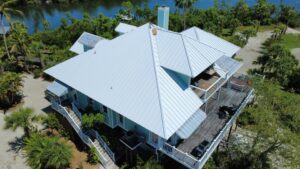Roof Longevity: Salt Air & Your Roof – How to Prevent Hidden Damage

Coastal living offers incredible views, ocean breezes, and a relaxed lifestyle—but for your roof, the salty air is a constant, invisible threat. Whether you’re in Florida, New Jersey, Delaware, Maryland, or Massachusetts, salt-laden winds can silently corrode metal, weaken fasteners, and shorten your roof’s lifespan if left unchecked.
At Reimagine Roofing, we’ve helped countless coastal homeowners combat salt damage and add years to their roofs’ lives. In this guide, we’ll explain how salt air affects roofing materials, outline preventive measures you can take right now, and show you how our free inspections and fast quotes can protect your home before damage sets in.
Why Salt Air is a Hidden Roof Killer
Salt particles from the ocean travel through the air, carried by breezes and storms. These microscopic particles settle on your roof’s surface and in crevices, where they:
- Accelerate Corrosion – Especially on unprotected metal roofing, flashing, nails, and gutters.
- Weaken Fasteners – Salt can rust screws, nails, and clips, leading to loose or missing shingles and panels.
- Stain and Pit Surfaces – Over time, salt residue can create visible stains and etch materials.
- Trap Moisture – Salt is hygroscopic, meaning it attracts water, keeping surfaces damp longer and increasing mold, mildew, and rot risks.
Even materials advertised as “weatherproof” can suffer from salt-related degradation if not maintained properly.
Materials Most Affected by Salt Air
Unprotected Steel
Steel corrodes rapidly in salty environments without protective coatings. Galvanized steel offers some resistance but may still rust over time.
Low-Grade Aluminum
While aluminum resists rust, lower grades can pit or weaken when exposed to constant salt spray.
Asphalt Shingles
Salt doesn’t directly harm asphalt, but it can erode protective granules over time and compromise metal components like flashing and drip edges.
Copper and Zinc
These metals form protective patinas that slow corrosion, making them better for coastal settings—though maintenance is still important.
Signs of Salt Air Roof Damage
You might not see severe damage until it’s too late, which is why regular inspections are critical. Watch for:
- Rust spots on flashing, gutters, or exposed fasteners
- Loose or lifted shingles due to corroded nails or clips
- White salt crust or pitting on metal surfaces
- Discoloration or streaking along roof panels
- Gutter leaks from pinhole corrosion
Preventive Maintenance for Coastal Roofs
Rinse Your Roof Regularly
Twice a year (or more if you live within 1,500 feet of the ocean), have your roof gently rinsed with fresh water to remove salt buildup. Avoid high-pressure washing, which can strip protective coatings or granules.
Choose Salt-Resistant Materials
For new roofs or replacements, opt for:
- Aluminum (marine-grade)
- Zinc or copper
- Coated metal panels (Kynar 500 or similar)
- Concrete or clay tile with salt-resistant glaze
Protect Metal Components
Apply corrosion-resistant sealants or coatings to flashing, fasteners, and gutters. Stainless steel hardware is ideal for coastal homes.
Maintain Gutters and Downspouts
Saltwater corrosion can cause leaks and blockages, so clean gutters quarterly and inspect seams.
Trim Coastal Vegetation
Overhanging branches can drip salty moisture directly onto your roof, accelerating wear.
Seasonal Salt Air Roof Care Checklist
Spring
- Rinse off winter salt buildup
- Inspect metal flashing and repaint if coatings are thin or damaged
- Check seals around vents, skylights, and chimneys
Summer
- Inspect for corrosion after thunderstorms or hurricanes
- Recoat vulnerable areas with corrosion inhibitors
- Clear gutters of summer debris
Fall
- Rinse away salt deposits from summer storms
- Trim trees ahead of nor’easter season
- Inspect and tighten roof fasteners
Winter
- Check for ice dams combined with salt corrosion (common in MA and NJ)
- Ensure attic ventilation to reduce condensation and corrosion risk
- Rinse roof after coastal storms if weather permits
How Much Damage Salt Can Really Do
Without preventive care, salt air can reduce a metal roof’s lifespan by 10–15 years and compromise asphalt shingle systems decades early. This means a roof expected to last 30 years might fail in 15–20.
The cost of corrosion-related repairs—from replacing rusted flashing to replacing entire sections—can easily surpass the cost of regular maintenance.
Why Professional Inspections Matter
Salt damage often hides in joints, under shingles, and inside gutters—places homeowners can’t easily check from the ground. A professional roof inspection twice a year ensures:
- Corrosion is detected before it spreads
- Damaged fasteners are replaced promptly
- Protective coatings are refreshed as needed
- You receive a clear report for insurance or warranty claims
Reimagine Roofing: Coastal Expertise You Can Trust
We know the coastal states—our team has serviced homes in Florida, New Jersey, Delaware, Maryland, and Massachusetts for years. We understand exactly how salt air behaves in your microclimate and how to protect your roof from premature aging.
- Free Roof Inspection – We’ll identify hidden salt air damage and recommend tailored solutions.
- Fast Quote Tool – Get an accurate repair or upgrade estimate in under 24 hours.
- Specialized Coastal Roofing Materials – We work with top suppliers to install and maintain salt-resistant systems.
Book Your Free Roof Inspection Today →
Get Your Fast, Accurate Quote in Under 24 Hours →
Coastal Roof Care Summary
- Salt air is a constant, invisible threat to your roof’s longevity
- Choose corrosion-resistant materials and coatings
- Rinse and inspect your roof regularly, especially after storms
- Schedule professional inspections twice a year
- Stay proactive—prevention is far cheaper than repairs
Salt Air Doesn’t Have to Win
Living by the coast doesn’t mean accepting shorter roof life. With the right materials, regular rinsing, corrosion protection, and professional oversight, you can enjoy ocean breezes without worrying about hidden roof damage.
Reimagine Roofing is here to help coastal homeowners take the guesswork out of roof care—and add years of reliable protection.
Protect Your Roof, Protect Your Home →
Schedule your Free Roof Inspection or request a Fast Quote today—and keep salt air damage at bay.

